| Listing 1 - 10 of 17 | << page >> |
Sort by
|
Book
Abstract | Keywords | Export | Availability | Bookmark
 Loading...
Loading...Choose an application
- Reference Manager
- EndNote
- RefWorks (Direct export to RefWorks)
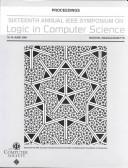
ISBN: 076951281X 9780769512815 Year: 2001 Publisher: IEEE
Abstract | Keywords | Export | Availability | Bookmark
 Loading...
Loading...Choose an application
- Reference Manager
- EndNote
- RefWorks (Direct export to RefWorks)
Engineering & Applied Sciences --- Computer Science --- Logic programming --- Congresses --- Logic programming - Congresses
Periodical
Abstract | Keywords | Export | Availability | Bookmark
 Loading...
Loading...Choose an application
- Reference Manager
- EndNote
- RefWorks (Direct export to RefWorks)
The Journal of Logic and Algebraic Programming is an international journal whose aim is to publish original research papers, survey and review articles, tutorial expositions, and historical studies in the areas of logical and algebraic methods and echniques for programming in its broadest sense. Topics of interest to the journal include : logic programming, constraint programming, abstract data types classes and objects components, process algebra and pi-calculus, term rewriting, lambda calculus, algebraic specification and verification of systems algebraic methods for syntax and semantics, applications of algebras, categories, domains, topological spaces and co-algebras to programming applications of proof theory and model theory to programming, programming with topological data types.
Logic programming --- Computer programming --- Programmation logique --- Programmation (Informatique) --- Périodiques. --- Computer programming. --- Logic programming. --- Wiskundige logica. --- Software. --- Computers --- Electronic computer programming --- Electronic data processing --- Electronic digital computers --- Programming (Electronic computers) --- Coding theory --- Programming
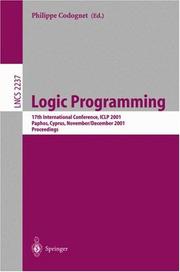
ISSN: 16113349 ISBN: 3540429352 9783540429357 354045635X Year: 2001 Volume: 2237 Publisher: Berlin, Heidelberg : Springer Berlin Heidelberg : Imprint: Springer,
Abstract | Keywords | Export | Availability | Bookmark
 Loading...
Loading...Choose an application
- Reference Manager
- EndNote
- RefWorks (Direct export to RefWorks)
Logic programming --- Programmation logique --- Congresses. --- Congrès --- Computer Science --- Engineering & Applied Sciences --- 681.3*D16 --- 681.3*D3 --- 681.3*F3 --- 681.3*F41 --- 681.3*I23 --- Computerwetenschap--?*D16 --- Programming languages --- Logics and meanings of programs (Theory of computation) --- Mathematical logic: computability theory; computational logic; lambda calculus; logic programming; mechanical theorem proving; model theory; proof theory;recursive function theory--See also {681.3*F11}; {681.3*I22}; {681.3*I23} --- Deduction and theorem proving: answer/reason extraction; reasoning; resolution; metatheory; mathematical induction; logic programming (Artificial intelligence) --- 681.3*I23 Deduction and theorem proving: answer/reason extraction; reasoning; resolution; metatheory; mathematical induction; logic programming (Artificial intelligence) --- 681.3*F41 Mathematical logic: computability theory; computational logic; lambda calculus; logic programming; mechanical theorem proving; model theory; proof theory;recursive function theory--See also {681.3*F11}; {681.3*I22}; {681.3*I23} --- 681.3*F3 Logics and meanings of programs (Theory of computation) --- 681.3*D3 Programming languages --- Logic programming. --- Congrès --- Computer science. --- Architecture, Computer. --- Software engineering. --- Computer programming. --- Programming languages (Electronic computers). --- Computer logic. --- Artificial intelligence. --- Computer Science. --- Computer System Implementation. --- Software Engineering/Programming and Operating Systems. --- Programming Techniques. --- Artificial Intelligence (incl. Robotics). --- Programming Languages, Compilers, Interpreters. --- Logics and Meanings of Programs. --- AI (Artificial intelligence) --- Artificial thinking --- Electronic brains --- Intellectronics --- Intelligence, Artificial --- Intelligent machines --- Machine intelligence --- Thinking, Artificial --- Bionics --- Cognitive science --- Digital computer simulation --- Electronic data processing --- Logic machines --- Machine theory --- Self-organizing systems --- Simulation methods --- Fifth generation computers --- Neural computers --- Computer science logic --- Logic, Symbolic and mathematical --- Computer languages --- Computer program languages --- Computer programming languages --- Machine language --- Languages, Artificial --- Computers --- Electronic computer programming --- Electronic digital computers --- Programming (Electronic computers) --- Coding theory --- Computer software engineering --- Engineering --- Architecture, Computer --- Informatics --- Science --- Programming --- Computer programming --- Computer network architectures. --- Logic design. --- Artificial Intelligence. --- Design, Logic --- Design of logic systems --- Digital electronics --- Electronic circuit design --- Logic circuits --- Switching theory --- Architectures, Computer network --- Network architectures, Computer --- Computer architecture
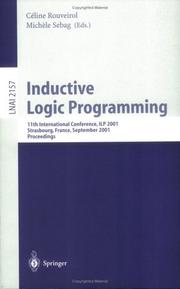
ISBN: 3540425381 3540447970 9783540425380 Year: 2001 Volume: 2157 Publisher: Berlin, Heidelberg : Springer Berlin Heidelberg : Imprint: Springer,
Abstract | Keywords | Export | Availability | Bookmark
 Loading...
Loading...Choose an application
- Reference Manager
- EndNote
- RefWorks (Direct export to RefWorks)
Logic programming --- 681.3*D16 <063> --- 681.3*I26 <063> --- 681.3*I23 <063> --- 681.3*F41 <063> --- 681.3*F22 <063> --- Computer programming --- Programming techniques: Logic programming--Congressen --- Learning: analogies; concept learning; induction; knowledge acquisition; language acquisition; parameter learning (Artificial intelligence)--See also {681.3*K32}--Congressen --- Deduction and theorem proving: answer/reason extraction; reasoning; resolution; metatheory; mathematical induction; logic programming (Artificial intelligence)--Congressen --- Mathematical logic: computability theory; computational logic; lambda calculus; logic programming; mechanical theorem proving; model theory; proof theory;recursive function theory--See also {681.3*F11}; {681.3*I22}; {681.3*I23}--Congressen --- Nonnumerical algorithms and problems: complexity of proof procedures; computations on discrete structures; geometrical problems and computations; pattern matching --See also {?681.3*E2-5}; {681.3*G2}; {?681.3*H2-3}--Congressen --- Computer Science --- Engineering & Applied Sciences --- 681.3*I23 <063> Deduction and theorem proving: answer/reason extraction; reasoning; resolution; metatheory; mathematical induction; logic programming (Artificial intelligence)--Congressen --- 681.3*I26 <063> Learning: analogies; concept learning; induction; knowledge acquisition; language acquisition; parameter learning (Artificial intelligence)--See also {681.3*K32}--Congressen --- Computer science. --- Architecture, Computer. --- Software engineering. --- Computer programming. --- Algorithms. --- Mathematical logic. --- Artificial intelligence. --- Computer Science. --- Computer System Implementation. --- Software Engineering/Programming and Operating Systems. --- Artificial Intelligence (incl. Robotics). --- Programming Techniques. --- Mathematical Logic and Formal Languages. --- Algorithm Analysis and Problem Complexity. --- AI (Artificial intelligence) --- Artificial thinking --- Electronic brains --- Intellectronics --- Intelligence, Artificial --- Intelligent machines --- Machine intelligence --- Thinking, Artificial --- Bionics --- Cognitive science --- Digital computer simulation --- Electronic data processing --- Logic machines --- Machine theory --- Self-organizing systems --- Simulation methods --- Fifth generation computers --- Neural computers --- Algebra of logic --- Logic, Universal --- Mathematical logic --- Symbolic and mathematical logic --- Symbolic logic --- Mathematics --- Algebra, Abstract --- Metamathematics --- Set theory --- Syllogism --- Algorism --- Algebra --- Arithmetic --- Computers --- Electronic computer programming --- Electronic digital computers --- Programming (Electronic computers) --- Coding theory --- Computer software engineering --- Engineering --- Architecture, Computer --- Informatics --- Science --- Foundations --- Programming --- Computer network architectures. --- Computer software. --- Artificial Intelligence. --- Software, Computer --- Computer systems --- Architectures, Computer network --- Network architectures, Computer --- Computer architecture --- Logic programming - Congresses
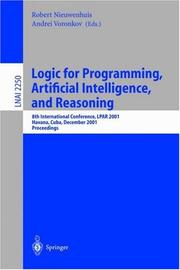
ISBN: 3540456538 3540429573 9783540429579 Year: 2001 Volume: 2250 Publisher: Berlin, Heidelberg : Springer Berlin Heidelberg : Imprint: Springer,
Abstract | Keywords | Export | Availability | Bookmark
 Loading...
Loading...Choose an application
- Reference Manager
- EndNote
- RefWorks (Direct export to RefWorks)
This volume contains the papers presented at the Eighth International C- ference on Logic for Programming, Arti?cial Intelligence and Reasoning (LPAR 2001), held on December 3-7, 2001, at the University of Havana (Cuba), together with the Second International Workshop on Implementation of Logics. There were 112 submissions, of which 19 belonged to the special subm- sion category of experimental papers, intended to describe implementations or comparisons of systems, or experiments with systems. Each submission was - viewed by at least three program committee members and an electronic program committee meeting was held via the Internet. The high number of submissions caused a large amount of work, and we are very grateful to the other 31 PC members for their e?ciency and for the quality of their reviews and discussions. Finally, the committee decided to accept 40papers in the theoretical ca- gory, and 9 experimental papers. In addition to the refereed papers, this volume contains an extended abstract of the invited talk by Frank Wolter. Two other invited lectures were given by Matthias Baaz and Manuel Hermenegildo. Apart from the program committee, we would also like to thank the other people who made LPAR 2001 possible: the additional referees; the Local Arran- ` gements Chair Luciano Garc´?a; Andr´es Navarro and Oscar Guell, ¨ who ran the internet-based submission software and the program committee discussion so- ware at the LSI Department lab in Barcelona; and Bill McCune, whose program committee management software was used.
Logic programming --- Artificial intelligence --- Automatic theorem proving --- Computer Science --- Mechanical Engineering - General --- Engineering & Applied Sciences --- Mechanical Engineering --- Program verification: assertion checkers; correctness proofs; reliability; validation (Software engineering)--See also {681.3*F31} --- Mathematical logic: computability theory; computational logic; lambda calculus; logic programming; mechanical theorem proving; model theory; proof theory;recursive function theory--See also {681.3*F11}; {681.3*I22}; {681.3*I23} --- Deduction and theorem proving: answer/reason extraction; reasoning; resolution; metatheory; mathematical induction; logic programming (Artificial intelligence) --- 681.3*I23 Deduction and theorem proving: answer/reason extraction; reasoning; resolution; metatheory; mathematical induction; logic programming (Artificial intelligence) --- 681.3*F41 Mathematical logic: computability theory; computational logic; lambda calculus; logic programming; mechanical theorem proving; model theory; proof theory;recursive function theory--See also {681.3*F11}; {681.3*I22}; {681.3*I23} --- 681.3*D24 Program verification: assertion checkers; correctness proofs; reliability; validation (Software engineering)--See also {681.3*F31} --- Computer science. --- Software engineering. --- Computer logic. --- Mathematical logic. --- Artificial intelligence. --- Computer Science. --- Artificial Intelligence (incl. Robotics). --- Software Engineering/Programming and Operating Systems. --- Logics and Meanings of Programs. --- Software Engineering. --- Mathematical Logic and Formal Languages. --- AI (Artificial intelligence) --- Artificial thinking --- Electronic brains --- Intellectronics --- Intelligence, Artificial --- Intelligent machines --- Machine intelligence --- Thinking, Artificial --- Bionics --- Cognitive science --- Digital computer simulation --- Electronic data processing --- Logic machines --- Machine theory --- Self-organizing systems --- Simulation methods --- Fifth generation computers --- Neural computers --- Algebra of logic --- Logic, Universal --- Mathematical logic --- Symbolic and mathematical logic --- Symbolic logic --- Mathematics --- Algebra, Abstract --- Metamathematics --- Set theory --- Syllogism --- Computer science logic --- Logic, Symbolic and mathematical --- Computer software engineering --- Engineering --- Informatics --- Science --- 681.3*D24 --- 681.3*F3 --- 681.3*F41 --- 681.3*I23 --- 681.3*F3 Logics and meanings of programs (Theory of computation) --- Logics and meanings of programs (Theory of computation) --- Logic design. --- Artificial Intelligence. --- Design, Logic --- Design of logic systems --- Digital electronics --- Electronic circuit design --- Logic circuits --- Switching theory --- Logic programming - Congresses --- Artificial intelligence - Congresses --- Automatic theorem proving - Congresses
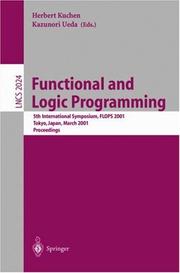
ISSN: 03029743 ISBN: 3540417397 9783540417392 3540447164 Year: 2001 Volume: 2024 Publisher: Berlin, Heidelberg : Springer Berlin Heidelberg : Imprint: Springer,
Abstract | Keywords | Export | Availability | Bookmark
 Loading...
Loading...Choose an application
- Reference Manager
- EndNote
- RefWorks (Direct export to RefWorks)
Functional programming (Computer science) --- Logic programming --- Computer Science --- Engineering & Applied Sciences --- Computer science. --- Computer programming. --- Programming languages (Electronic computers). --- Computer logic. --- Artificial intelligence. --- Computer Science. --- Programming Languages, Compilers, Interpreters. --- Programming Techniques. --- Logics and Meanings of Programs. --- Artificial Intelligence (incl. Robotics). --- Logic design. --- Artificial Intelligence. --- AI (Artificial intelligence) --- Artificial thinking --- Electronic brains --- Intellectronics --- Intelligence, Artificial --- Intelligent machines --- Machine intelligence --- Thinking, Artificial --- Bionics --- Cognitive science --- Digital computer simulation --- Electronic data processing --- Logic machines --- Machine theory --- Self-organizing systems --- Simulation methods --- Fifth generation computers --- Neural computers --- Design, Logic --- Design of logic systems --- Digital electronics --- Electronic circuit design --- Logic circuits --- Switching theory --- Informatics --- Science --- Computer science logic --- Logic, Symbolic and mathematical --- Computers --- Electronic computer programming --- Electronic digital computers --- Programming (Electronic computers) --- Coding theory --- Computer languages --- Computer program languages --- Computer programming languages --- Machine language --- Languages, Artificial --- Programming --- Functional programming (Computer science) - Congresses --- Logic programming - Congresses
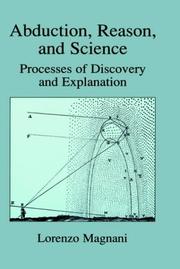
ISBN: 0306465140 1461346371 144198562X Year: 2001 Publisher: New York (N.Y.): Kluwer
Abstract | Keywords | Export | Availability | Bookmark
 Loading...
Loading...Choose an application
- Reference Manager
- EndNote
- RefWorks (Direct export to RefWorks)
This volume explores abduction (inference to explanatory hypotheses), an important but neglected topic in scientific reasoning. My aim is to inte grate philosophical, cognitive, and computational issues, while also discuss ing some cases of reasoning in science and medicine. The main thesis is that abduction is a significant kind of scientific reasoning, helpful in delineating the first principles of a new theory of science. The status of abduction is very controversial. When dealing with abduc tive reasoning misinterpretations and equivocations are common. What are the differences between abduction and induction? What are the differences between abduction and the well-known hypothetico-deductive method? What did Peirce mean when he considered abduction a kind of inference? Does abduction involve only the generation of hypotheses or their evaluation too? Are the criteria for the best explanation in abductive reasoning epis temic, or pragmatic, or both? How many kinds of abduction are there? The book aims to increase knowledge about creative and expert infer ences. The study of these high-level methods of abductive reasoning is situ ated at the crossroads of philosophy, epistemology, artificial intel1igence, cognitive psychology, and logic; that is, at the heart of cognitive science. Philosophers of science in the twentieth century have traditionally distin guished between the inferential processes active in the logic of discovery and the ones active in logic of justification.
Abduction (Logic) --- Discoveries in science --- Science --- -681.3*I23 --- Natural science --- Science of science --- Sciences --- Breakthroughs, Scientific --- Discoveries, Scientific --- Scientific breakthroughs --- Scientific discoveries --- Creative ability in science --- Research --- Logic --- Reasoning --- Syllogism --- Philosophy --- Deduction and theorem proving: answer/reason extraction; reasoning; resolution; metatheory; mathematical induction; logic programming (Artificial intelligence) --- Discoveries in science. --- Philosophy. --- 681.3*I23 Deduction and theorem proving: answer/reason extraction; reasoning; resolution; metatheory; mathematical induction; logic programming (Artificial intelligence) --- Abduction (Logic). --- 681.3*I23 --- Normal science --- Philosophy of science --- Philosophy and science. --- Logic. --- Cognitive psychology. --- History. --- Philosophy of Science. --- Cognitive Psychology. --- History, general. --- Psychology, Cognitive --- Cognitive science --- Psychology --- Argumentation --- Deduction (Logic) --- Deductive logic --- Dialectic (Logic) --- Logic, Deductive --- Intellect --- Thought and thinking --- Science and philosophy --- Annals --- Auxiliary sciences of history --- Methodology

ISBN: 3540451420 3540421270 9783540421276 Year: 2001 Volume: 2042 Publisher: Berlin, Heidelberg : Springer Berlin Heidelberg : Imprint: Springer,
Abstract | Keywords | Export | Availability | Bookmark
 Loading...
Loading...Choose an application
- Reference Manager
- EndNote
- RefWorks (Direct export to RefWorks)
Logic programming --- Computer Science --- Engineering & Applied Sciences --- Specifying anf verifying and reasoning about programs: assertions; invariants; mechanical verification; pre- and post-conditions (Logics and meanings of programs)--See also {681.3*D21}; {681.3*D24}; {681.3*D31}; {681.3*E1} --- Mathematical logic: computability theory; computational logic; lambda calculus; logic programming; mechanical theorem proving; model theory; proof theory;recursive function theory--See also {681.3*F11}; {681.3*I22}; {681.3*I23} --- Automatic programming: automatic analysis of algorithms; program modification; program synthesis; program transformation; program verification (Artificialintelligence)--See also {681.3*D12}; {681.3*F31} --- 681.3*I22 Automatic programming: automatic analysis of algorithms; program modification; program synthesis; program transformation; program verification (Artificialintelligence)--See also {681.3*D12}; {681.3*F31} --- 681.3*F41 Mathematical logic: computability theory; computational logic; lambda calculus; logic programming; mechanical theorem proving; model theory; proof theory;recursive function theory--See also {681.3*F11}; {681.3*I22}; {681.3*I23} --- 681.3*F31 Specifying anf verifying and reasoning about programs: assertions; invariants; mechanical verification; pre- and post-conditions (Logics and meanings of programs)--See also {681.3*D21}; {681.3*D24}; {681.3*D31}; {681.3*E1} --- Computer science. --- Software engineering. --- Computer programming. --- Computer logic. --- Mathematical logic. --- Artificial intelligence. --- Computer Science. --- Software Engineering/Programming and Operating Systems. --- Logics and Meanings of Programs. --- Programming Techniques. --- Artificial Intelligence (incl. Robotics). --- Mathematical Logic and Formal Languages. --- Computers --- Electronic computer programming --- Electronic data processing --- Electronic digital computers --- Programming (Electronic computers) --- Coding theory --- Computer software engineering --- Engineering --- Informatics --- Science --- AI (Artificial intelligence) --- Artificial thinking --- Electronic brains --- Intellectronics --- Intelligence, Artificial --- Intelligent machines --- Machine intelligence --- Thinking, Artificial --- Bionics --- Cognitive science --- Digital computer simulation --- Logic machines --- Machine theory --- Self-organizing systems --- Simulation methods --- Fifth generation computers --- Neural computers --- Algebra of logic --- Logic, Universal --- Mathematical logic --- Symbolic and mathematical logic --- Symbolic logic --- Mathematics --- Algebra, Abstract --- Metamathematics --- Set theory --- Syllogism --- Computer science logic --- Logic, Symbolic and mathematical --- Programming --- 681.3*D11 --- 681.3*D16 --- 681.3*F31 --- 681.3*F41 --- 681.3*I22 --- 681.3*D11 Applicative (functional) programming --- Applicative (functional) programming --- Computerwetenschap--?*D16 --- Logic design. --- Artificial Intelligence. --- Design, Logic --- Design of logic systems --- Digital electronics --- Electronic circuit design --- Logic circuits --- Switching theory --- Logic programming - Congresses
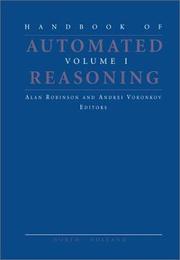
ISBN: 0444508139 0444829490 0444508120 0262182211 026218222X 0262182238 9786612284946 1282284940 0080532799 9780444508133 9780444829498 9780444508126 9780080532790 Year: 2001 Publisher: Amsterdam ; London : Elsevier,
Abstract | Keywords | Export | Availability | Bookmark
 Loading...
Loading...Choose an application
- Reference Manager
- EndNote
- RefWorks (Direct export to RefWorks)
Handbook of Automated Reasoning
Qualitative reasoning --- Automatic theorem proving --- Raisonnement qualitatif --- Théorèmes --- Démonstration automatique --- 681.3*D24 --- 681.3*F4 --- 681.3*I22 --- 681.3*I23 --- Program verification: assertion checkers; correctness proofs; reliability; validation (Software engineering)--See also {681.3*F31} --- Mathematical logic and formal languages (Theory of computation) --- Automatic programming: automatic analysis of algorithms; program modification; program synthesis; program transformation; program verification (Artificialintelligence)--See also {681.3*D12}; {681.3*F31} --- Deduction and theorem proving: answer/reason extraction; reasoning; resolution; metatheory; mathematical induction; logic programming (Artificial intelligence) --- Automatic theorem proving. --- Qualitative reasoning. --- 681.3*I23 Deduction and theorem proving: answer/reason extraction; reasoning; resolution; metatheory; mathematical induction; logic programming (Artificial intelligence) --- 681.3*I22 Automatic programming: automatic analysis of algorithms; program modification; program synthesis; program transformation; program verification (Artificialintelligence)--See also {681.3*D12}; {681.3*F31} --- 681.3*F4 Mathematical logic and formal languages (Theory of computation) --- 681.3*D24 Program verification: assertion checkers; correctness proofs; reliability; validation (Software engineering)--See also {681.3*F31} --- Théorèmes --- Démonstration automatique --- Information Technology --- General and Others --- Artificial intelligence. --- AI (Artificial intelligence) --- Artificial thinking --- Electronic brains --- Intellectronics --- Intelligence, Artificial --- Intelligent machines --- Machine intelligence --- Thinking, Artificial --- Bionics --- Cognitive science --- Digital computer simulation --- Electronic data processing --- Logic machines --- Machine theory --- Self-organizing systems --- Simulation methods --- Fifth generation computers --- Neural computers --- Artificial intelligence --- Reasoning
| Listing 1 - 10 of 17 | << page >> |
Sort by
|

 Search
Search Feedback
Feedback About UniCat
About UniCat  Help
Help News
News